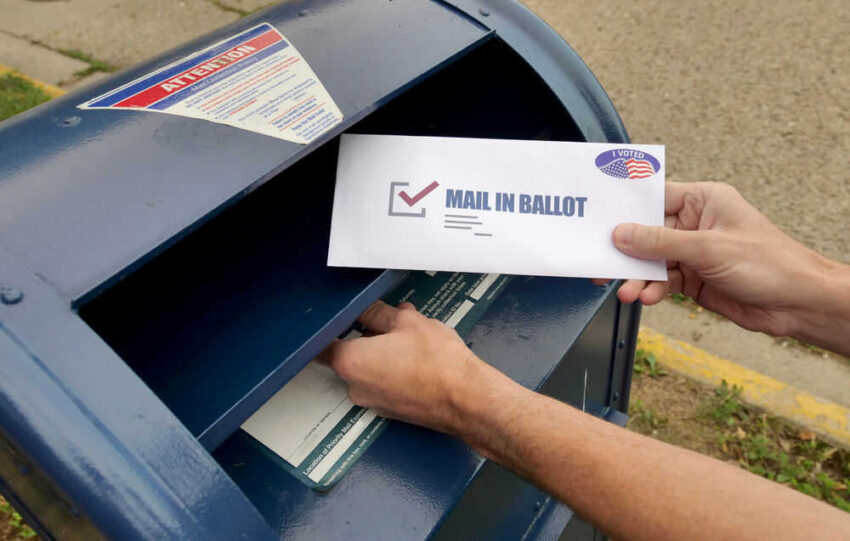(LibertySociety.com) – One presidential vow to ban mail-in ballots and voting machines threatens to reshape American elections, and the battle lines are already drawn.
Story Snapshot
- President Trump announced plans for an executive order to eliminate mail-in ballots and voting machines ahead of the 2026 midterms.
- The move is framed as restoring “honesty” to elections, but critics warn it will ignite legal and constitutional showdowns.
- States traditionally run elections, putting Trump’s federal authority claim center stage for political and judicial scrutiny.
- Election security experts and bipartisan audits repeatedly debunk claims of widespread fraud in current voting methods.
Trump’s Announcement Sets the Stage for Election Showdown
President Donald Trump’s August 18, 2025, social media blast did more than stoke his base, it unleashed a political tempest. Declaring war on mail-in ballots and voting machines, Trump vowed to sign an executive order before the 2026 midterms, promising to “bring HONESTY” back to American elections. His message was clear: only paper ballots, counted by hand, can guarantee the integrity of democracy. Media outlets scrambled to report the announcement, while legal experts and politicians braced for a cascade of challenges and consequences.
Trump’s assertion was as audacious as it was polarizing. By describing states as “agents” of federal election authority, he set up a direct challenge to the long-held American principle that states control how their citizens vote. The announcement, coming more than a year before ballots are cast, signals a calculated campaign to pressure states and mobilize supporters around the issue. But the absence of a signed executive order or detailed implementation plan left the public, and lawmakers, guessing what comes next, and how deep this fight could cut.
Historical Roots and Political Motivations Fuel the Controversy
America’s voting systems have always been a patchwork, with states wielding primary authority. The pandemic in 2020 turbocharged mail-in voting, sparking a partisan clash over security and accessibility. Trump and allies repeatedly claimed, without evidence, that mail-in ballots and voting machines were vulnerable to fraud, a narrative that survived multiple investigations, court cases, and recounts, none of which substantiated the accusations. The recurring theme: election integrity versus voter access, with each side convinced the other threatens the core of democracy.
Republican-led states spent years tightening mail-in voting rules and scrutinizing technology, even as bipartisan commissions and audits found no widespread fraud. The Arizona audit of 2021 is a case in point, with results confirming accuracy rather than exposing flaws. Trump’s renewed focus in 2025 serves both as red meat for his base and a test of federal power against state sovereignty, a conflict as old as American federalism itself.
Stakeholders Brace for Impact: Legal, Economic, and Social Aftershocks
Trump’s executive order plan instantly put key stakeholders on alert. State election officials, who administer ballots and oversee machines, face the prospect of federal overreach. Voting rights groups anticipate a battle to preserve mail-in and machine voting for the elderly, disabled, military, and overseas citizens. Election technology firms watch their business model hang in the balance, while legal experts predict a wave of court cases challenging the constitutionality of any sweeping federal intervention.
The power dynamics are unmistakable: Trump commands the White House, but states control the machinery of voting. Congress could intervene, but the real fight may play out in the courts. The legal debate centers on whether the president can override state authority in election administration, a question with no clear precedent, and with high stakes for the future of American democracy.
Immediate Backlash and the Road Ahead: Legal Battles and Public Debate
The reaction to Trump’s pledge was swift. Critics condemned it as a thinly veiled attempt to suppress votes and undermine faith in the system. Supporters hailed it as the only path to secure elections, echoing Trump’s assertion that current methods are “Highly ‘Inaccurate,’ Very Expensive, and Seriously Controversial.” Yet, no executive order has been released, leaving pundits and officials speculating on timing, scope, and legal viability. The looming legal showdown promises months of uncertainty, with federal courts likely to decide the limits of presidential power.
Short-term impacts include confusion among voters and election officials, heightened polarization, and a spike in litigation. Long-term, a federal ban on mail-in ballots and machines could fundamentally alter how Americans vote, potentially disenfranchising millions and forcing costly changes to election infrastructure. The social and political ripples will touch every corner of the country, further intensifying an already divided climate.
Expert Analysis Underscores Deep Divisions and High Stakes
Election security specialists and bipartisan watchdogs remain united: claims of widespread fraud in mail-in and machine voting lack evidence. Legal scholars argue the Constitution grants states, not the federal government, primary authority over elections, making Trump’s executive order legally suspect. Fiona Hill, a former Trump adviser, warns that foreign actors could exploit the chaos to erode trust in democracy. The consensus among major news outlets and election monitors is clear, the integrity of current voting systems is not in question; the real battle is over who controls them.
Trump’s supporters frame the issue as common sense, calling for stricter controls to protect elections. Opponents see a dangerous precedent, one that risks disenfranchising voters and undermining democratic norms. With the 2026 midterms on the horizon, the nation faces a showdown not just over ballots and machines, but over the very meaning of election integrity and federalism.
Copyright 2025, LibertySociety.com .
Click this link for the original source of this article.
Author: Editor
This content is courtesy of, and owned and copyrighted by, https://libertysociety.com and its author. This content is made available by use of the public RSS feed offered by the host site and is used for educational purposes only. If you are the author or represent the host site and would like this content removed now and in the future, please contact USSANews.com using the email address in the Contact page found in the website menu.








